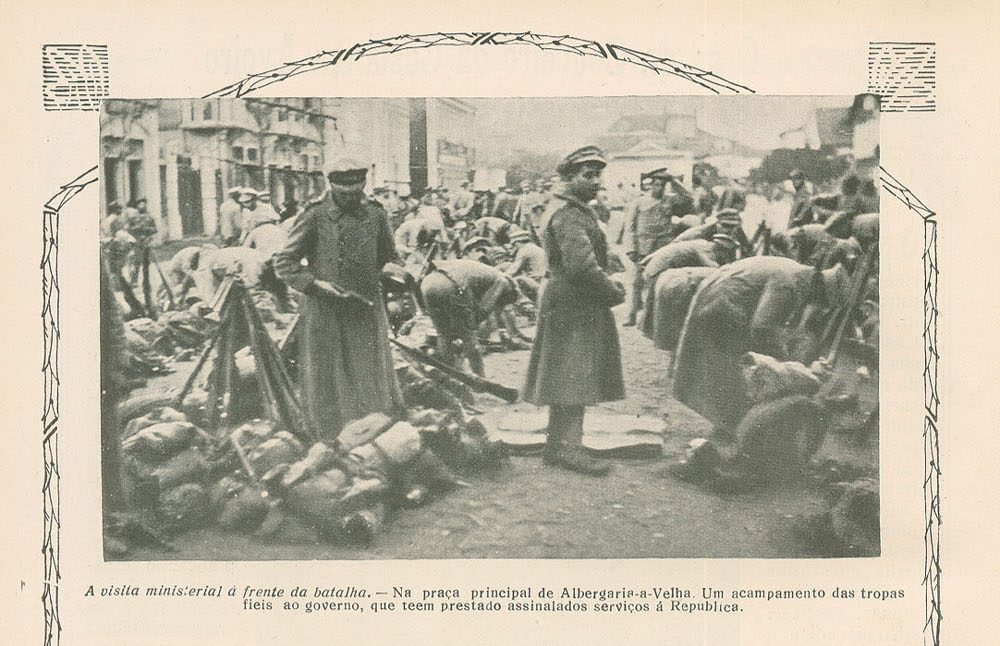In Memory of Those Who Gave Their Lives for The King
Letter from the editor in the newspaper Soberania do Povo, published on 25 January 1922
In Memory of Those Who Gave Their Lives for The King
Next Friday marks the third anniversary of the ‘Barreiras Battle’, when our peaceful and serene town become the stage for the carnage of armed combat. As in the Great War, the illustrious like to remember the great exploits and notable characters, relegating ordinary soldiers to expressions like ‘effectives’, and their slaughter to ‘casualties’ or ‘losses’. As if such small words could encompass a lifetime.
In our fields and roads walked men as tall as Paiva Couceiro or Francisco Rolão Preto, names that will never be erased from encyclopaedias and compendiums, and even the soldiers under their command will appear in some troop lists. But what about the others? Who will remember their names when the Kingdom doesn’t even recognise their participation in the fight? or the people of Águeda have not forgotten their own, recruited against their will by the monarchist combatants, when their defeat seemed certain, and they had no idea that the ‘March of the Elephants’ would save them. Fathers, sons, husbands, and brothers. Country people, simple, who couldn’t tell the difference between a king and a president, and for whom it would mean the same if their land were governed either from Lisbon or from Oporto, cities they will never see in their lives, anyway. People like Zé da Rita, who was born in Cabeço de Bustos, but had just married in Mourisca, and was expecting a son, who was shot on his doorstep for refusing to serve the King. Ti’ Amaro, from Segadães, buried incomplete after a grenade from the South shattered his arm and leg into nothing. João Semedo, better known as João Sem Medo[1], for the bravery with which he fought in Flanders, but whose fate ended in the rice paddies of Carqueijo, shot by a stray bullet, that made him fall among the grain he was cultivating.
He wasn’t the only one to suffer this fate, there were others who struggled in France, Angola and Mozambique, only to see their lives end in yet another war that wasn’t their own, less than a year after their return, still giving thanks to the Almighty God for having escaped the hell of those miserable confrontations.
But the lines of this disgusting story are not written only by the combatants: when the monarchists retreated to Albergaria-a-Velha and abandoned us to the whims of the people of Lisbon, their revenge on the population was terrible. Farms destroyed, animals slaughtered, shacks burned, and the less we said about the Republican soldiers’ abuse of our women, the better.
It would have been desirable that the fighting had taken place there, in the lands of Albergaria, and our fields had been nothing more than a landscape in the armies’ path. Or that our Sem Medo had been granted the same grace given to Soldado Milhões, and this city declared neutral territory. The pages of this newspaper wouldn’t be enough to list the names of all those who died and suffered, but just one name would be one too many.
I ask the ministers and marshals of the King to forgive the audacity of this modest editor, who in no way desires the defeat of the Paladino, and wishes nothing more than a long and happy reign for King Manuel II and his wife, Maria III, who, moreover, had the grace and kindness to donate a production of the miraculous wine fuel to the Cooperativa Agrícola e Vinícola de Águeda, which has contributed greatly to the development of our esteemed municipality.
It’s a shame such success came from the blood of our fellow countrymen.
Let’s all pray that the worst is over and that no new warmongering will appear to blacken our horizon.
For peace, always.
The editor, Albano de Melo Ribeiro Pinto
Soberania do Povo, 25 January 1922
[1] A Portuguese wordplay between “Semedo” and “Sem Medo” – “without fear”.
 «Ilustração Portuguesa», 2.ª série, n.º 679 [Hemoroteca Digital] (https://hemerotecadigital.cm-lisboa.pt/OBRAS/IlustracaoPort/1919/N679/N679_item1/P10.html)
«Ilustração Portuguesa», 2.ª série, n.º 679 [Hemoroteca Digital] (https://hemerotecadigital.cm-lisboa.pt/OBRAS/IlustracaoPort/1919/N679/N679_item1/P10.html)
Jornal Soberania do Povo, fundado em 1879, tendo continuado a ser publicado ininterruptamente até hoje. Em 1922, o seu diretor era ainda o fundador, Albano de Melo Ribeiro Pinto.
Cooperativa Agrícola dos Lavradores de Águeda, a qual inspirou a Cooperativa Agrícola e Vinícola de Águeda.
O Irmão Esquecido: https://hyp.up.pt/o-irmao-esquecido/
Opinião Própria | Deniz Ramos | O Combate das Barreiras: https://www.soberaniadopovo.pt/news/01071/Deniz-Ramos-O-Combate-das-Barreiras-Agueda
Comments